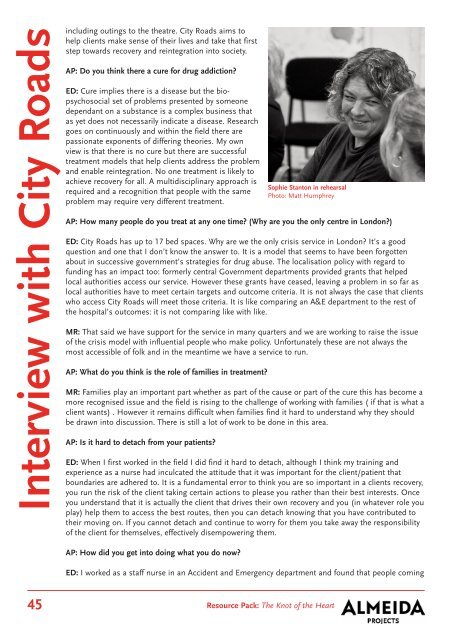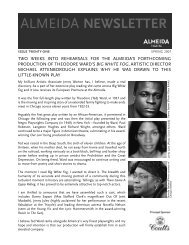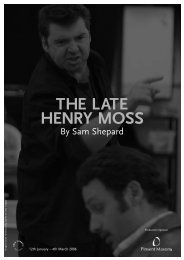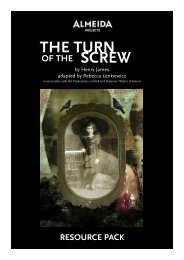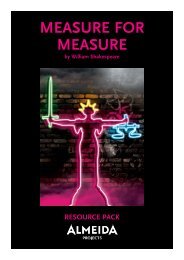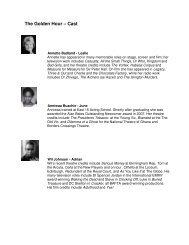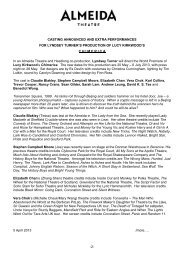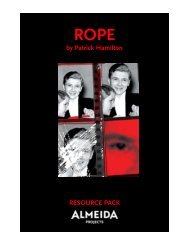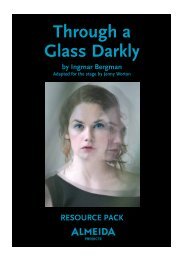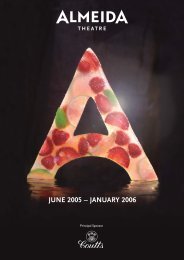KNOT HEART - Almeida Theatre
KNOT HEART - Almeida Theatre
KNOT HEART - Almeida Theatre
- No tags were found...
Create successful ePaper yourself
Turn your PDF publications into a flip-book with our unique Google optimized e-Paper software.
Interview with City Roadsincluding outings to the theatre. City Roads aims tohelp clients make sense of their lives and take that firststep towards recovery and reintegration into society.AP: Do you think there a cure for drug addiction?ED: Cure implies there is a disease but the biopsychosocialset of problems presented by someonedependant on a substance is a complex business thatas yet does not necessarily indicate a disease. Researchgoes on continuously and within the field there arepassionate exponents of differing theories. My ownview is that there is no cure but there are successfultreatment models that help clients address the problemand enable reintegration. No one treatment is likely toachieve recovery for all. A multidisciplinary approach isrequired and a recognition that people with the sameproblem may require very different treatment.AP: How many people do you treat at any one time? (Why are you the only centre in London?)ED: City Roads has up to 17 bed spaces. Why are we the only crisis service in London? It’s a goodquestion and one that I don’t know the answer to. It is a model that seems to have been forgottenabout in successive government’s strategies for drug abuse. The localisation policy with regard tofunding has an impact too: formerly central Government departments provided grants that helpedlocal authorities access our service. However these grants have ceased, leaving a problem in so far aslocal authorities have to meet certain targets and outcome criteria. It is not always the case that clientswho access City Roads will meet those criteria. It is like comparing an A&E department to the rest ofthe hospital’s outcomes: it is not comparing like with like.MR: That said we have support for the service in many quarters and we are working to raise the issueof the crisis model with influential people who make policy. Unfortunately these are not always themost accessible of folk and in the meantime we have a service to run.AP: What do you think is the role of families in treatment?MR: Families play an important part whether as part of the cause or part of the cure this has become amore recognised issue and the field is rising to the challenge of working with families ( if that is what aclient wants) . However it remains difficult when families find it hard to understand why they shouldbe drawn into discussion. There is still a lot of work to be done in this area.AP: Is it hard to detach from your patients?Sophie Stanton in rehearsalPhoto: Matt HumphreyED: When I first worked in the field I did find it hard to detach, although I think my training andexperience as a nurse had inculcated the attitude that it was important for the client/patient thatboundaries are adhered to. It is a fundamental error to think you are so important in a clients recovery,you run the risk of the client taking certain actions to please you rather than their best interests. Onceyou understand that it is actually the client that drives their own recovery and you (in whatever role youplay) help them to access the best routes, then you can detach knowing that you have contributed totheir moving on. If you cannot detach and continue to worry for them you take away the responsibilityof the client for themselves, effectively disempowering them.AP: How did you get into doing what you do now?ED: I worked as a staff nurse in an Accident and Emergency department and found that people coming45Resource Pack: The Knot of the Heart


